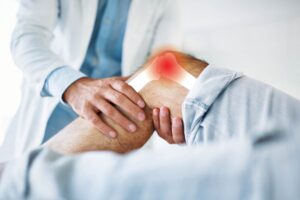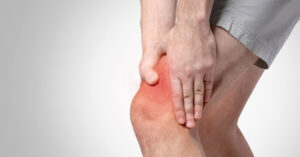Knee Joint Calcification

By: Assoc. Dr. Ata Can
Knee Joint Calcification
It is a disease that occurs as a result of the wear and deterioration of the cartilage tissue in the knee joint over time. Knee joint arthritis, is often associated with old age. However, it can also develop at younger ages due to factors such as excessive joint stress, injuries, and obesity. Arthritis can cause pain, stiffness, swelling and limitation of movement in the joint.
What are the symptoms of Knee Joint Calcification?
The most obvious symptom is usually pain. Pain may increase with movement or when pressure is applied to the joint. Pain can be felt on the inside or outside of the knee. They often experience a feeling of stiffness in the knee in the morning. Stiffness may be evident after sitting for long periods of time or after waking up in the morning. The joint area may feel warm. It may be a sign of increased joint inflammation.
Swelling and swelling may occur in the area. Swelling may be caused by increased fluid within the joint. Sometimes crackling or clicking sounds may be heard as the joint moves. Noises may indicate that the joint surfaces are wearing and rubbing. As the disease progresses, movement restrictions may occur. It may not be completely bent or straightened.
Sometimes they may experience pain at rest, especially at night. Pain can disrupt a person's sleep. Knee joint arthritis symptoms It may vary from person to person and its severity may vary. If you are experiencing symptoms, it is important to consult an orthopedic and traumatologist. The appropriate treatment and management plan can help reduce pain and improve your quality of life.
What are the Causative Factors?
Aging is a common cause of disease. Cartilage can wear down more as we age, which can lead to problems. Family history may increase risk.
The role of genetic factors can affect an individual's cartilage structure. Carrying excess body weight puts extra stress and can increase risk. Obesity can cause the cartilage of the knee joint to wear away faster.
Knee injuries can increase the risk. Sports injuries or injuries resulting from overexertion may also increase the risk. Poor posture or incorrect movement habits can put extra stress on the joint and increase the risk.
Overuse or overload can cause rapid wear of the cartilage. Especially carrying heavy loads or activities that constantly strain the joint can affect this factor. Some metabolic diseases may increase the risk. For example, diseases such as diabetes or gout can affect risk.
Some studies show that women's risk is higher than men. Knee joint arthritis It is a complex problem and multiple factors may come together to cause this disorder.
To reduce risk factors, it is necessary to adopt a healthy lifestyle. It is also important to control your weight and exercise regularly. It is also important to take appropriate protective measures to avoid knee injuries.
What are the Treatment Methods for Knee Joint Calcification?
Physical therapy may include exercises to increase muscle strength, maintain joint mobility, and reduce pain. Proper exercises can help strengthen the joint and increase its flexibility. Your doctor or physical therapist will make recommendations.
Painkillers are recommended to be prescribed by your doctor to relieve the pain. Knee braces suitable for your orthopedic health can be used to increase the stability of the joint or reduce pain.
A cane or crutches serve as a walking aid, relieving pain and helping you maintain balance. In severe cases, knee replacement surgery may be required to treat it. In this procedure, damaged joint surfaces are replaced with prosthetic implants.
When necessary, knee arthroscopy, a minimally invasive method that repairs damage and relieves pain, is used. The treatment plan may vary depending on the person's symptoms and age. In addition, physical condition and knee joint arthritis It is also personalized depending on its severity. Contact us to evaluate treatment options and determine the appropriate one.







